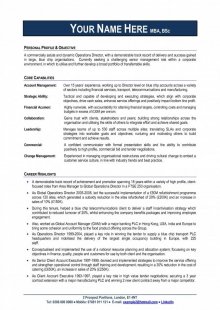How to Write a Professional CV
The Web seems to be one of the key drivers of this trend as our daily lives are turned into a digital reality that you cannot escape if you wish to progress (read more here). If this sounds like a William Gibson novel, its not meant too, but the comparison cannot be avoided. The main reason for this is where your CV goes first; This is usually a recruiter. If not a recruiter, then a recruiter database and then a recruiter. Either way, your CV will be scrutinised in a very quick and simple way.
The recruiter
will look for what it needs to fulfil the role on offer. It will look for tangible evidence such as achievements and responsibilities. It will examine how this links with experience, how recent the experience is, how this experience matches the current requirement and then will form a judgement upon you and a benchmark against the role.
The database
will parse your CV, reference the detail of the document and then look for suitable roles and notify the recruiters of your suitability whilst also putting your name as a potential against other roles. All of this is achieved through a pre-set of criteria that have been determined by, you guessed it, the recruiter.
You then have to consider that the vast majority of recruiters are inexperienced twenty-somethings and are just treading water until they get a “proper job” The worrying trend here is that the situation is not only becoming worse but spreading into once credible firms. As desperate managers put more and more pressure on the staff so they increase the churn of staff and dilute the credibility of the recruitment market. Don’t just take our word for it, type “recruiters are a waste of time” into any search engine and look at the results.
We also have to give credit to those that perform at the very top of their game. You will know when you have talked to these people as they will work incredibly hard and efficiently to help you if they can see that you have helped yourself.
What do you need to do?
Try to look at your CV and be impartial. If you are a manager ask yourself this: Would you employ you? Does your CV really cover what’s important? How long is it? Does it give away too much about i.e. Personal interests Enjoys socialising (drinks too much) and watching football (drinks too much and probable thug). OK, that’s an over exaggeration, but nobody really cares, even less so if you mention nothing. Or maybe you should try and be a little smarter and say Interests are endurance cycling and marathon running every second Saturday. That would make everyone think that you have the commitment, endurance and the mental strength to achieve great things.
Stand out and stand up. If you manage the content of the CV correctly then recruiters will not have to think as you would have done it for them. Briefly tell them about the companies you have worked for (A couple of lines should suffice and if you have an up to date company url, use it)
Match key responsibilities and key achievements to the companies that you have worked for. If you are the greatest change manager the world has ever seen then be clear about which company that was for. Do this for all roles. Take a CV completely in the direction of the role that you wish to win. Align your key strengths to the role that you are after.
Formatting a CV shows a level of care, attention and consistency. It sharpens the impact of the CV and draws the attention of the reader.
Do not use more than two fonts. See the examples here:
To clarify:
Ensure your CV has visual impact by using a bold heading or colour accents; your application will be one of many, so stand out from your Peers.
Open your CV with a punchy professional profile which is succinct, positive and contains key words; busy employers and recruiters will make a decision on you within the first few seconds. Match your key skills and experience to the advertisement or Job Description you have seen by mimicking some of the key words listed in the essential criteria and re-ordering your achievements to prioritise the most relevant.
A CV should be a ‘billboard’ about you, which is succinct and retains the attention of the reader; keep the document to two pages if possible and use bullet points to highlight key skills and experience effectively.
Creating a simple and stylish footer on the CV which displays your contact details, saves space and ensures that they are accessible and visible to the reader at all times.
Ensure your CV is factual and honest; false claims and qualifications will cause embarrassment once scrutinised during the formal interview process and come back to haunt you during referencing!
Never explain personal circumstances or include negative language, this is your one chance to make a first impression and focus on the positive – other details can be revealed at a later stage.
ALWAYS check your document for spelling and grammar; set your default spellchecker to English UK; errors make a bad impression and will cost you your invitation to a formal interview.
Never go to great detail on employment from 10+ years ago; instead, list the role plus one or two achievements under ‘early work history’.
Or you can use our service and have a Professional CV Writer compile a CV for you. Details

